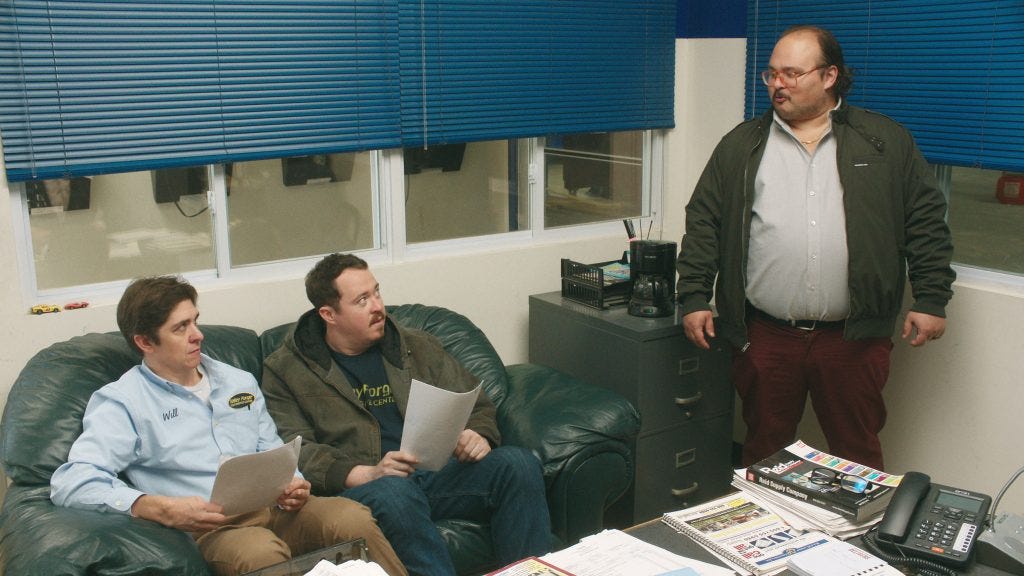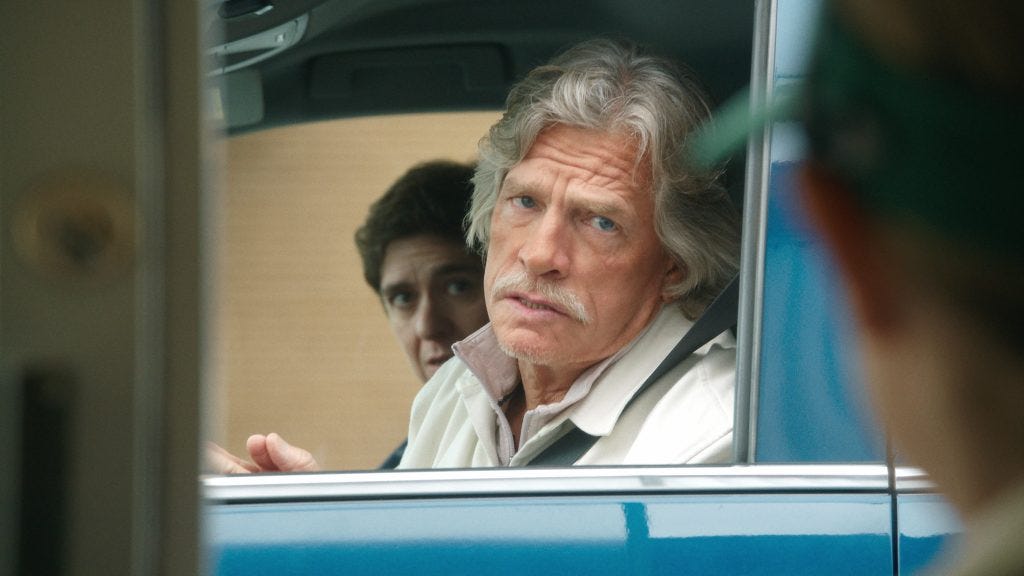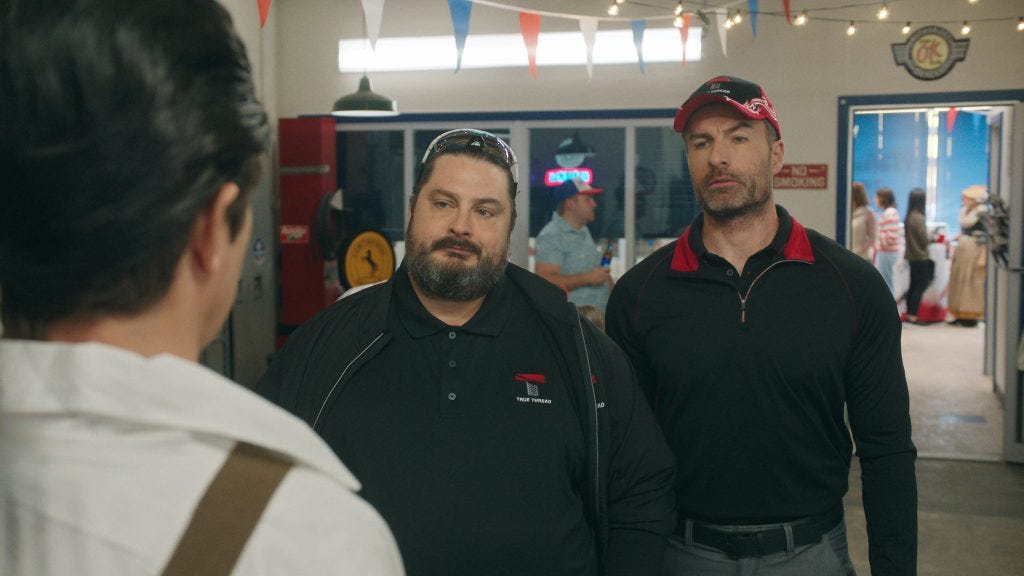TIRES SEASON TWO REVIEW: See Shane Gillis' Heart Grow Three Sizes [4/5]
Can You Count All the Cameos?
[Rating 4/5] - dir. John McKeever - 2025 - United States - R - 12 Episodes - Sitcom
This review first appeared at That Shelf.
What stand-up comedian, sketch performer, and actor Shane Gillis and his merry crew of Dirtbag Left creatives don’t want you to know is… they’re actually pretty nice people when it comes down to it.
Sure, you could point to, frankly, a litany of ill-advised “jokes” on their respective podcasts, but throw on an episode of Tires (Gillis’ Netflix sitcom, now in its second season, set at repair shop Valley Forge Automative Centre), and it’s clear these guys care more about making people feel better than they let on.
With that said, given only a quick glance at the balance of the cast, Tires looks a little askew.
The only notable name (Gillis, as Shane) is not exactly the centre of the show. If Gillis is its broad, bullish Sun, then gifted actor, performer, and co-creator of the show (along with Gillis and director John McKeever), Steve “Gerbies” Gerben, who portrays Will, Shane’s anxious cousin, franchise manager, and son of the VFAC owner, is its sweet Moon.
This decision to co-centre Gerbies quickly makes sense. The two leads make each other look better, and not in an adversarial Jim vs. Dwight way, but in a brotherly (or shall I say cousinly) way. Will begins where Shane ends. The former is able to immediately ingratiate himself thanks to his bashful attitude towards anything resembling a compliment, his terrified sing-song kind of speech, and his Bull Dog eyes.
Watch him explain the problem with ordering meat pizza and cheese pizza instead of just cheese pizza and you will walk away a believer. If one unknown emerges from Tires a complete comedic package, it’s Gerbies.

In addition to Gillis and Gerbies, standup comedian and podcaster Stavros Halkias returns as Dave, who works directly under Will’s dad and serves as a foil to Will himself. Comedic actors Chris O’Connor and Kilah Fox also return as Cal and Kilah, respectively.
This is a struggling, modest auto repair shop (one franchise of a few). It is so desperate, the staff’s ridiculous ideas get honest consideration. Not only that, Will’s apprehension to really take charge means the ridiculous ideas manifest, often leading the business one step forward and two steps back.
I’m not going to beat around the bush.
In the first season, there’s creative wordplay, endearing physical comedy, and a solid guest star, but I felt like I was watching talented creatives squander good opportunity after good opportunity in favour of building episodes around what amounted to narrative distractions, there purely to facilitate only a shade of Shane Gillis’ comedic persona and to mine the same man-child ore every slacker leading man has since the ’90s.
Basically, the show was like its characters: Resigned to hitting the bare minimum with the occasional big win. Only at the last moment does something like true potential appear.

Obviously Netflix thought that potential was enough, so not only do we have a second season, it’s twice as long. That’s a big gamble for a show that seemed allergic to anything more than a perfunctory, occasional, incremental plot development and a cursory look inside the minds of the characters.
Good news: Season two fixes that immediately.
Valley Forge is now successful, flush with cash, and ultimately happy. That means the show can turn inward, and dig into motivation outside of, “I need money to survive.”
Shane even has a girlfriend, providing even more opportunity internal exploration. Her name is Kelly (perfectly played with an improv cheekiness by Veronika Slowikowska). Shane loves her. So much. So, so much. A lot.
When Will’s dad decides he’s seriously considering selling VFAC and heading into retirement, his brother, Shane’s father, Phil (Thomas Haden Church), enters the picture. The problem with Phil taking over is he’s prone to selling an investment the second it starts to perform poorly, and Valley Forge often performs poorly. If that happens, no matter how much Phil may love his son and nephew, everyone’s out of a job.
Church plays Phil and elevates the role from cameo to true supporting cast member. The man puts his passive aggression, gruff voice, and surfer charm to good use. Some of the show’s most inventive jokes arrive the same time Church does. One standout example is when Will and Phil are having a private conversation about Shane in the break room. Just below their hushed whispers is the sound of a cricket. Finally, Phil asks about it. “Oh, yeah, Shane leaves crickets in here when he wants you to feel guilty,” Will explains.
Another bit comes in the form Gillis playing wounded teen anthem “Father of Mine” any time he feels wronged by his dad and knows he’s nearby. After a few rounds of this, Church says, “That’s not even the best song on the album!” These men are slowly, belatedly, learning how to deal with their emotions, but sometimes they backslide into the most aggressive form of passive aggression available.
Every cameo (Jon Lovitz as an Irate Customer, Vince Vaughn as a charismatic salesman, H. Foley as a rival, and Steph Tolev as Halkias’ deranged wife, to name just a few), make sense the way Danny DeVito and It’s Always Sunny In Philadelphia makes sense: They don’t just complement the billing, they complement the comedy.
In season two, the jokes are sharper, the plot is deeper, and the updated amount of focus paid to each character sits better. Shane and Will are now firmly equals. Halkias, Fox, and O’Connor all take a back seat to make room for Thomas Haden Church, but they get to wrestle with a lot more than they ever did in the first season. Halkias actually contends with his immorality and the loss of his plum spot as Will’s father’s right hand man. O’Connor isn’t simply another shade of Gillis, and Kilah Fox isn’t simply their Lisa Kudrow. They reflect on the changes at the business and, intriguingly, take the hint to change themselves.
Honourable mention goes to the smart choice of all-but-erasing Andrew Schulz and Tommy Pope as the Italian stereotypes. Even if the two respective actor-comedians are happy playing them, and that solves that problem, another problem remains: Two characters playing the same one note the same one way.
Thanks to these updates, the emotional payoffs are that much more satisfying, sometimes even tender. The Simpsons showcased Homer as a lazy employee, a bad husband, and a worse father, but at the end of the day, he, or we, would learn a lesson.
Tires revives that kind of ’90s lesson-teaching (albeit a little less directly) with solid success.
The most obvious tell that this show and its characters have hearts of gold comes in the form of the main title music, a piano-driven, indie-folk-pop jingle that wouldn’t sound out of place on a Wilco album. It starts with a bang, and then hums along sweetly. Open an episode with whatever low-brow humour you like, Mr. Gillis; as soon as the theme music enters, it imbues everything that comes before, and everything that comes after, with a sense of emotional importance and groundedness.
It should be said, as much as Tires has self-improved, it is not for everyone. This season of Tires will not change the minds of those who find these comedians’ stand-up premises, their language, and some of the plots in season one deplorable. These men are boys. It does not try and then fail to live up to the ever-shifting moral expectations of a vocal minority — it doesn’t try at all. Additionally, it is no longer content to wallow in arrested development, which means it might also alienate a different vocal minority.
If a show knows what it wants to be, all it can do is strive to be the best version of that.
It is then up to the audience whether or not they embrace it.
—
Tires season two is out now on Netflix.
[Rating 4/5] - dir. John McKeever - 2025 - United States - R - 12 Episodes - Sitcom






